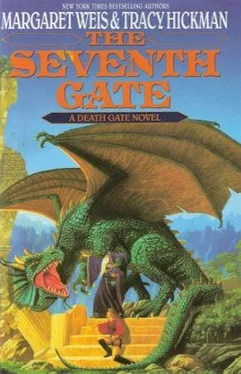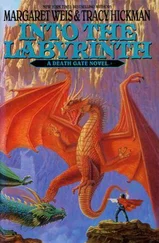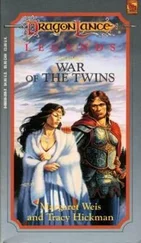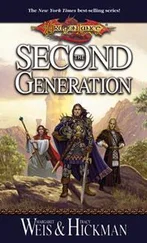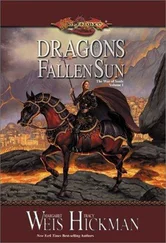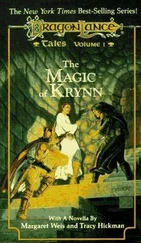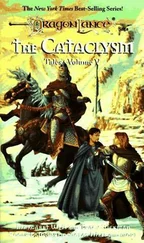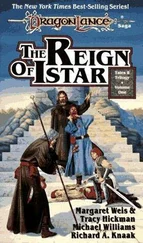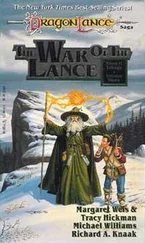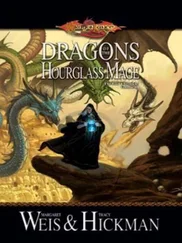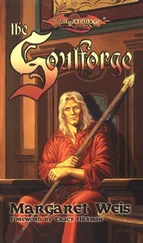Margaret Weis - The Seventh Gate
Здесь есть возможность читать онлайн «Margaret Weis - The Seventh Gate» весь текст электронной книги совершенно бесплатно (целиком полную версию без сокращений). В некоторых случаях можно слушать аудио, скачать через торрент в формате fb2 и присутствует краткое содержание. Жанр: Фэнтези, на английском языке. Описание произведения, (предисловие) а так же отзывы посетителей доступны на портале библиотеки ЛибКат.
- Название:The Seventh Gate
- Автор:
- Жанр:
- Год:неизвестен
- ISBN:нет данных
- Рейтинг книги:3 / 5. Голосов: 1
-
Избранное:Добавить в избранное
- Отзывы:
-
Ваша оценка:
- 60
- 1
- 2
- 3
- 4
- 5
The Seventh Gate: краткое содержание, описание и аннотация
Предлагаем к чтению аннотацию, описание, краткое содержание или предисловие (зависит от того, что написал сам автор книги «The Seventh Gate»). Если вы не нашли необходимую информацию о книге — напишите в комментариях, мы постараемся отыскать её.
The Seventh Gate — читать онлайн бесплатно полную книгу (весь текст) целиком
Ниже представлен текст книги, разбитый по страницам. Система сохранения места последней прочитанной страницы, позволяет с удобством читать онлайн бесплатно книгу «The Seventh Gate», без необходимости каждый раз заново искать на чём Вы остановились. Поставьте закладку, и сможете в любой момент перейти на страницу, на которой закончили чтение.
Интервал:
Закладка:
Secretly appalled at what he had done, Samah left Chelestra, intending to travel to Abarrach. Here, as he had learned from Alfred, the Sartan were practicing the ancient and forbidden art of necromancy.
“If,” Samah reasoned, “I could bring the dead back to life, we would have a force strong enough to defeat the dragon-snakes, and once again rule the four worlds.”
Samah never lived to learn the art of raising the dead. He was captured, along with a strange old Sartan who called himself Zifnab, by their ancient enemy the Patryns, who had accompanied their lord Xar to Abarrach. Xar was there also to learn the art of necromancy. He ordered Samah executed, then attempted to raise the Sartan’s body through magical means.
Xar’s plan was thwarted. Samah’s soul was freed by an undead Sartan named Jonathon, of whom the prophecy says, “He will bring life to the dead, hope to the living, and for him the Gate will open.”
Following the departure of Samah from Chelestra, the other Sartan remaining on the Chalice—the only stable piece of land in the water-bound world—have been waiting impatiently, and with growing anxiety, for his return.
“The Councillor has been gone well past the time he himself set. We can no longer function leaderless. I urge you, Ramu, to accept your father’s position of Head of the Council of Seven.”
Ramu glanced around at each of the other six members. “Is this what you all think? Are you all of one mind?”
“We are.” They spoke in nods and words. [4] The leadership of the Council is not hereditary, just as membership on the Council is not hereditary. The seven chosen to serve on the Council, the governing body of the Sartan, elect one of themselves to serve as leader. Just how the seven themselves were chosen in those early days is not known, was kept secret by the Sartan, who undoubtedly feared some Patryn might attempt to influence the decision. Ramu was servitor to the Council—a position required before one can become a member. Either Ramu was promoted to full Council member during the emergency period when the mensch flooded the city or he took over his exiled mother’s Council post.
Ramu had been carved from the same cold stone as Samah, his father. Not much could warm either man. Hard and unyielding, Ramu would shatter before he would bend. It was never twilight in Ramu’s vision—it was day or night. The sun shone brightly or darkness engulfed his world. And even when the sun shone, it cast shadows.
But he was basically a good man, honorable, a devoted father, friend, and husband. And if his worry over his own father’s disappearance was not etched on the rock-hard surface of his face, it had been burned deep within.
“Then I accept,” Ramu said. Glancing around the group again, he added, “until such time as my father returns.”
All on the Council gave agreement. To do otherwise would have been to disparage Samah.
Rising to his feet, his white robes brushing softly against the surface of the floor—a surface that was still cold and damp to the touch, despite the fact that the flood-waters had receded—Ramu moved from his seat at the end of the table to take his place in the chair in the center.
The other members of the Council of Seven rearranged themselves to suit, three sitting on Ramu’s left and three on his right.
“What business is brought before the Council this day?” Ramu asked.
One of the members stood up. “The mensch have returned a third time to sue for peace, Councillor. They have asked to meet with the Council.”
“We have no need to meet with them. For a peaceful settlement, they must meet our terms, as given to them by my father. They know what those are, I believe?”
“Yes, Councillor. The mensch either move off the Chalice, move off our lands which they usurped by force, or they agree to swear fealty to us, to permit themselves to be governed by us.”
“And what is their answer to these terms?”
“They will not leave the lands they have taken, Councillor. To be quite fair, they have nowhere else to go. Their former homelands, the seamoons, are now locked in ice.”
“They could climb in those boats of theirs and sail after the sun, go search for new homelands.”
“They see no need for such a traumatic upheaval in their lives, Councillor. There is land enough for all here on the Chalice. They cannot understand why they cannot settle it.”
The Sartan’s tone implied that he could not quite understand it, either. Ramu frowned, but at that moment, another Council member rose, asked leave to speak.
“To be fair to the mensch, Councillor,” she said deferentially, “they are ashamed of their past actions and are quite willing to ask our forgiveness and be friends. They have made improvements to the land, begun to build homes, establish businesses. I’ve seen these myself.”
“Indeed, Sister?” Ramu’s face darkened. “You have traveled among them?”
“Yes, Councillor. It was at their invitation. I saw no harm and the other members agreed with me. You were not available—”
“What’s done is done, Sister.” Ramu coldly ended the discussion. “Please continue. What have the mensch done to our land?”
No one missed the emphasis on the pronoun.
The Sartan nervously cleared her throat. “The elves have settled near the seashore. Their cities are going to be extraordinarily beautiful, Councillor, with dwellings made of coral. The humans have settled farther inland, in the forests which they love, but with access to the sea, granted them by the elves. The dwarves have moved into caverns in the mountains in the interior. They are mining the minerals, raising goats and sheep. They have set up forges—”
“Enough!” Ramu’s face was livid with anger. “I’ve heard enough. They have set up forges, you say. Forges to make weapons of steel which they will use to attack either us or their neighbors. The peace of our lives will be shattered, just as it was long ago. The mensch are quarrelsome, violent children who need our direction and control.”
The Council member was inclined to argue. “But they appear to be living quite peacefully—”
Ramu waved his hand, brushed her words away. “The mensch may get along for a time, particularly if they have some new toy to keep them occupied. But their own history shows that they cannot be trusted. They will either agree to live by our rules, under our laws, or they can depart.”
The Sartan glanced uncertainly around the Council. The other members indicated with nods that she was to continue. “Then ... uh ... the mensch have given me their terms for peace, Councillor.”
“Their terms!” Ramu was amazed. “Why should we bother to listen to their terms?”
“They consider that they won a victory over us, Councillor,” said the Sartan. She flushed beneath Ramu’s baleful gaze. “And it must be admitted that they could do the very same thing to us again. They control the floodgates. They could open them at any time, flood us out. The seawater is devastating to our magic. Some of us have only just recently regained complete use of our power. Without our magic, we are more helpless than the mensch—”
“Mind what you say, Sister!” Ramu warned.
“I speak the truth, Councillor,” the Sartan returned quietly. “You cannot deny it.”
Ramu did not argue. His hands, lying flat on the table, drew inward; the fingers curled over nothing. The stone table was cold, smelled wet and musty. “What about my father’s suggestion? Have we made any attempt to destroy these floodgates, seal them shut?”
“The floodgates are far below water level, Councillor. We cannot reach them, and even if we could, our magic would be rendered powerless by the water itself. Besides”—her voice lowered—“who knows but that the evil dragon-snakes are down there still, lying in wait.”
Читать дальшеИнтервал:
Закладка:
Похожие книги на «The Seventh Gate»
Представляем Вашему вниманию похожие книги на «The Seventh Gate» списком для выбора. Мы отобрали схожую по названию и смыслу литературу в надежде предоставить читателям больше вариантов отыскать новые, интересные, ещё непрочитанные произведения.
Обсуждение, отзывы о книге «The Seventh Gate» и просто собственные мнения читателей. Оставьте ваши комментарии, напишите, что Вы думаете о произведении, его смысле или главных героях. Укажите что конкретно понравилось, а что нет, и почему Вы так считаете.
